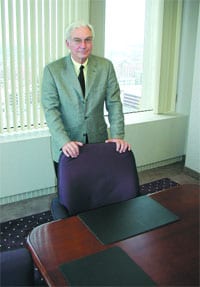HealthCare Law – Marijuana Use in Elder Facilities – Individuals are Caught Between a State and a Federal Place
Imagine your aunt Sarah, 84 years old, three-year resident of an assisted-living facility in a small Massachusetts city.
She is thriving there, making friends, and actively participating in organized activities. She takes blood-pressure medication, and, because she doesn’t drive, you pick up her prescription and deliver it to the facility, where it is stored and dispensed by the staff. In her fourth year there, Sarah is diagnosed with breast cancer and opts to treat the disease aggressively with chemotherapy and radiation.
Once fairly robust, Sarah begins to suffer the effects of the chemotherapy. Her nausea diminishes her quality of life, and she loses weight. Her oncologist suggests exploring medical marijuana to alleviate the nausea and stimulate her appetite.
The legalization of medical marijuana took effect in Massachusetts in January 2013. An Act for the Humanitarian Medical Use of Marijuana legalized marijuana for “the treatment of debilitating medical conditions, or the symptoms thereof.” Such conditions are defined by the statute as cancer, glaucoma, HIV-positive status, AIDS, hepatitis C, ALS, Crohn’s disease, Parkinson’s disease, multiple sclerosis, and, more vaguely, “other conditions as determined in writing by a qualifying patient’s physician.”
By these definitions, Sarah would seem to qualify for medical marijuana. After receiving certification of a debilitating condition from her doctor, Sarah could submit that certification to the Department of Health and receive a registration card. She would then use this card to obtain marijuana from a licensed dispensary.
If Sarah lived at home and drove, she could take her registration card to the nearest dispensary and store the marijuana at home. But what are the considerations now that Sarah lives at an assisted-living facility? Indeed, how will the growing population of elders at assisted-living and skilled-nursing facilities across the state take advantage of this legal treatment option?
It is important to remember that marijuana remains illegal under federal law. In recognition of increasing public support of and state action on legalization, the Obama administration has repeatedly asserted that federal prosecution of medical-marijuana distribution and use will remain a “low priority.” Additionally, Congress recently passed an amendment that prohibits the Justice Department from undermining state medical-marijuana laws — for 2015.
Despite this turning of the federal blind eye, will the owners and management of elder-care communities — both assisted-living and skilled-nursing facilities — take the risk of flouting federal law? If the facility admits patients receiving Medicaid, will it lose its federal funding? Will nursing staff be allowed to store and distribute this legal-yet-illegal substance? If Sarah can’t administer the drug herself, will a staff nurse or care attendant be authorized by the facility to help her? If Sarah opts to smoke the drug, will the facility allow it if there are restrictions on smoking? Will a family member be allowed to pick up her marijuana at the dispensary for her, as with her blood pressure medication from the pharmacy?
The Massachusetts statute allows for a “personal caregiver” to assist with a patient’s medical use of marijuana. Like the patient, caregivers may also receive a registration card to procure a patient’s marijuana. The statute states that “an employee of a hospice provider, nursing, or medical facility providing care to a qualifying patient may also serve as a personal caregiver.” Such caregivers, along with patients and healthcare professionals, are expressly protected under the law from state prosecution. In this scenario, both family and a staff member at Sarah’s facility could become personal caregivers under the law and assist Sarah with the procurement, storage, and administration of the drug.
Despite express protection from state prosecution, the Massachusetts statute also notes that “nothing in this law … purports to give immunity under federal law,” and “nothing in this law poses an obstacle to federal enforcement of federal law.” Presidential promises and the one-year hiatus from prosecution may be small comfort to administrators of elder-care facilities. The fear not only of prosecution, but also of loss of licensure and federal funding, are genuine concerns that may affect an elderly resident’s access to this particular treatment.
Attorney Valerie Vignaux is an associate attorney with Bacon Wilson and a member of the firm’s Estate Planning and Elder Law team. She assists clients with all manner of estate planning and provides representation for guardianship and conservatorship matters. She also spent a year serving as Superior Court Clerk to the justices of the Massachusetts Trial Court; (413) 781-0560; vvignaux@



Comments are closed.